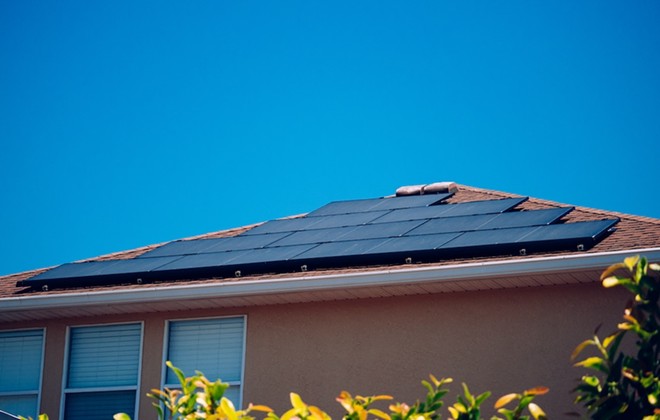After DeSantis scrubs 'climate change' from state law, Florida begins repealing renewable-energy goals
The goals, put in place in 2022, have called for utilities to gradually increase the amount of renewable energy that they produce or buy
By Jim Saunders, News Service of Florida on Wed, May 22, 2024 at 2:03 pm
Carrying out a controversial law signed last week by Gov. Ron DeSantis, officials have started moving to repeal state renewable-energy goals.
The goals, put in place in 2022, have called for utilities to gradually increase the amount of renewable energy that they produce or buy until reaching 100 percent renewable energy in 2050.
But a proposal published Wednesday by the state Department of Agriculture and Consumer Services’ Office of Energy would repeal a rule that includes the goals, saying it is “no longer necessary.”
The law (HB 1645) signed last week by DeSantis revamps state energy policies, including deleting part of a law that directed the Department of Agriculture and Consumer Services to establish “goals and strategies for increasing the use of renewable energy in this state.”
More broadly, the law, which will take effect July 1, will remove references in law to reducing greenhouse-gas emissions, bar potential offshore wind-energy generation and call for encouraging a “cost-effective and affordable energy supply.”
In a post last week on the social-media platform X, DeSantis said state officials are “restoring sanity in our approach to energy and rejecting the agenda of the radical green zealots.”
But the law’s opponents said Florida should not reduce the emphasis on addressing climate change. For example, The Cleo Institute, which works on climate-change issues, said on its website that “Florida’s legislative shift underscores a growing divide between state policies and public concern over climate change, emphasizing immediate energy costs over long-term environmental sustainability.”
The renewable-energy goals were approved in 2022 under then-Agriculture Commissioner Nikki Fried. They said utilities should seek to have 40 percent renewable energy by 2030; 63 percent by 2035; 82 percent by 2040; and 100 percent by 2050.
Fried, a Democrat, unsuccessfully ran for governor in 2022 and was replaced by Republican Wilton Simpson.
Utilities in recent years have dramatically expanded construction of solar-energy facilities as technology has improved and costs have decreased. A House staff analysis of the new law said renewable energy generated about 6 percent of the electricity used in the state in 2021; that number is expected to reach 28 percent by 2032.
As an example of the continued growth in renewable energy, Duke Energy Florida and Tampa Electric Co. this spring proposed base-rate plans that include building more solar facilities. The plans are pending at the Florida Public Service Commission.
But electric generation in Florida remains dominated by the use of natural gas to fuel power plants, and the new law reflects at least a philosophical shift by the Republican-controlled Legislature.
For example, it will eliminate part of current law that says, “The Legislature finds that the state's energy security can be increased by lessening dependence on foreign oil; that the impacts of global climate change can be reduced through the reduction of greenhouse gas emissions; and that the implementation of alternative energy technologies can be a source of new jobs and employment opportunities for many Floridians.”
That will be replaced, in part, by sentences that say, “The purpose of the state's energy policy is to ensure an adequate, reliable, and cost-effective supply of energy for the state in a manner that promotes the health and welfare of the public and economic growth. The Legislature intends that governance of the state's energy policy be efficiently directed toward achieving this purpose.”
Among other things, the law will ease a regulation on building natural-gas pipelines. Pipelines within Florida that are 15 miles or longer currently need certification under a law known as the Natural Gas Transmission Pipeline Siting Act. Under the new law, the requirement will apply to pipelines 100 miles or longer.
Also, it calls for the Public Service Commission to “evaluate the technical and economic feasibility of using advanced nuclear power technologies,” including what are known as small modular reactors, to meet electric-power needs.
Subscribe to Orlando Weekly newsletters.
Follow us: Apple News | Google News | NewsBreak | Reddit | Instagram | Facebook | Twitter | Or sign up for our RSS Feed
The goals, put in place in 2022, have called for utilities to gradually increase the amount of renewable energy that they produce or buy until reaching 100 percent renewable energy in 2050.
But a proposal published Wednesday by the state Department of Agriculture and Consumer Services’ Office of Energy would repeal a rule that includes the goals, saying it is “no longer necessary.”
The law (HB 1645) signed last week by DeSantis revamps state energy policies, including deleting part of a law that directed the Department of Agriculture and Consumer Services to establish “goals and strategies for increasing the use of renewable energy in this state.”
More broadly, the law, which will take effect July 1, will remove references in law to reducing greenhouse-gas emissions, bar potential offshore wind-energy generation and call for encouraging a “cost-effective and affordable energy supply.”
In a post last week on the social-media platform X, DeSantis said state officials are “restoring sanity in our approach to energy and rejecting the agenda of the radical green zealots.”
But the law’s opponents said Florida should not reduce the emphasis on addressing climate change. For example, The Cleo Institute, which works on climate-change issues, said on its website that “Florida’s legislative shift underscores a growing divide between state policies and public concern over climate change, emphasizing immediate energy costs over long-term environmental sustainability.”
The renewable-energy goals were approved in 2022 under then-Agriculture Commissioner Nikki Fried. They said utilities should seek to have 40 percent renewable energy by 2030; 63 percent by 2035; 82 percent by 2040; and 100 percent by 2050.
Fried, a Democrat, unsuccessfully ran for governor in 2022 and was replaced by Republican Wilton Simpson.
Utilities in recent years have dramatically expanded construction of solar-energy facilities as technology has improved and costs have decreased. A House staff analysis of the new law said renewable energy generated about 6 percent of the electricity used in the state in 2021; that number is expected to reach 28 percent by 2032.
As an example of the continued growth in renewable energy, Duke Energy Florida and Tampa Electric Co. this spring proposed base-rate plans that include building more solar facilities. The plans are pending at the Florida Public Service Commission.
But electric generation in Florida remains dominated by the use of natural gas to fuel power plants, and the new law reflects at least a philosophical shift by the Republican-controlled Legislature.
For example, it will eliminate part of current law that says, “The Legislature finds that the state's energy security can be increased by lessening dependence on foreign oil; that the impacts of global climate change can be reduced through the reduction of greenhouse gas emissions; and that the implementation of alternative energy technologies can be a source of new jobs and employment opportunities for many Floridians.”
That will be replaced, in part, by sentences that say, “The purpose of the state's energy policy is to ensure an adequate, reliable, and cost-effective supply of energy for the state in a manner that promotes the health and welfare of the public and economic growth. The Legislature intends that governance of the state's energy policy be efficiently directed toward achieving this purpose.”
Among other things, the law will ease a regulation on building natural-gas pipelines. Pipelines within Florida that are 15 miles or longer currently need certification under a law known as the Natural Gas Transmission Pipeline Siting Act. Under the new law, the requirement will apply to pipelines 100 miles or longer.
Also, it calls for the Public Service Commission to “evaluate the technical and economic feasibility of using advanced nuclear power technologies,” including what are known as small modular reactors, to meet electric-power needs.
Subscribe to Orlando Weekly newsletters.
Follow us: Apple News | Google News | NewsBreak | Reddit | Instagram | Facebook | Twitter | Or sign up for our RSS Feed

WE LOVE OUR READERS!
Since 1990, Orlando Weekly has served as the free, independent voice of Orlando, and we want to keep it that way.
Becoming an Orlando Weekly Supporter for as little as $5 a month allows us to continue offering readers access to our coverage of local news, food, nightlife, events, and culture with no paywalls.
Scroll to read more Florida News articles
Newsletters
Join Orlando Weekly Newsletters
Subscribe now to get the latest news delivered right to your inbox.
















